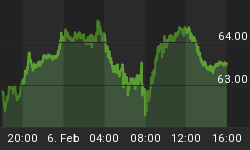Emerging Markets Point To Slower Global Growth

In the early 1990s, U.S. investors did not pay much attention to economic happenings in the likes of Vietnam, India, or Brazil. By the time Thomas Freidman's book The World Is Flat hit the shelves in 2005, U.S. investors were overwhelmed with non-stop hype about the opportunities in emerging economies. Fast forward to 2014 and we find things have changed. From Forbes:
Not too long ago, emerging markets were the reason the global economy was growing at 5% or more. Now, the reason why the global economy is not growing at those levels is because of emerging, not developed markets. Given that emerging economies now account for over half the world economy, continued sub-par economic performance for several of the major emerging markets is likely to mean that global growth remains only moderate in the near term, the Organization for Economic Cooperation and Development (OECD) said Tuesday in its Interim Economic Assessment.
Since global growth impacts the vast majority of U.S. firms, stock market bulls would love to see improving corporate performance in emerging markets. From an investment perspective, you do not need to be well versed in chart reading to see investors in China (FXI) have lagged U.S. stock investors (SPY) significantly over the past five years.

Profits Now Falling In Dollar Terms
On March 10, we noted the high correlation between corporate earnings and stock prices. Fed policy and exchange rates have played a role in less appealing corporate results in emerging economies. From The Economist:
This year Western firms' giant bet on the emerging world will come under more scrutiny. American firms made a 12% return on equity in 2012, roughly in line with their global average. But having grown fast, profits are now falling in dollar terms. There has been a long bout of share-price underperformance as investors have lost their euphoria. An index run by Stoxx, a data firm, of Western firms with high emerging-market exposures has lagged the broader S&P 500 index by about 40% over three years (see chart 1). And the recovery in the rich world will mean there will be more competition for resources within firms.
If emerging markets once again become an attractive investment alternative, the performance of EEM relative to SPY has to improve (chart below). The evidence may change, but it has not yet.

Investment Implications: So Far, Volatility To Ignore
If the stock market went up every day, it would be easy to remain invested and make money, which highlights the importance of understanding volatility. Tuesday, the S&P 500 dropped 9 points. Thus far, Tuesday's session falls into the "volatility to ignore" category for long positions. From Reuters:
U.S. stocks fell in afternoon trading on Tuesday after swinging between gains and losses for most of the session as the lack of major corporate earnings or market-affecting data kept trading directionless. U.S. wholesale inventories rose more than expected in January, as companies built up stocks of autos and machinery, but sales posted their largest decline in nearly five years. Retailers in the news included American Eagle and Urban Outfitters, their shares down sharply after disappointing outlooks.
If weakness morphs into something more meaningful from a risk-management perspective, we will reduce our exposure to stocks. That has not happened yet, and thus we continue to hold core positions in U.S. stocks (SPY), and the technology sector (QQQ). The markets are looking for an economic catalyst, something the emerging markets could provide.















